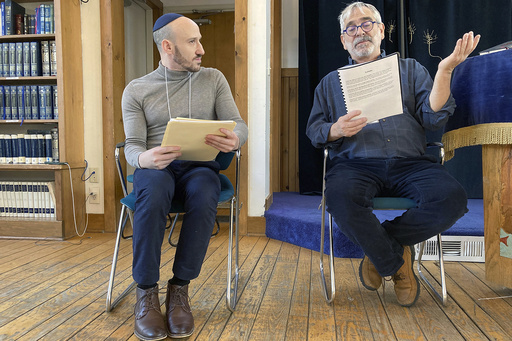
Falls Village, Connecticut, is currently hosting a three-day retreat for Orthodox Jews who identify as LGBTQ+, a gathering that has developed into an annual event allowing attendees the freedom to express their dual identities. Among the participants is Zippy Spanjer, a 29-year-old from Rochester, New York, who shared her feelings of comfort in an environment where being both Jewish and queer is embraced. Spanjer expressed the challenges she has faced in finding communal acceptance, stating, “In the Jewish spaces, you never know how someone’s gonna think about the queer stuff, and in the queer spaces you never know how someone’s gonna think about the religious stuff. And to me, these aren’t diametrically opposed.”
During her time at the Isabella Freedman Jewish Retreat Center, situated amid the picturesque Berkshire Mountains, Spanjer engaged in Shabbat rituals alongside 96 other queer Jews, sharing prayers, songs, and personal stories. “I feel embraced,” she stated, reflecting the atmosphere of support and acceptance at the retreat.
The event, organized by Eshel, a nonprofit organization aiming to foster inclusive Orthodox Jewish communities, featured a colorful array of participants. Attendees ranged from men in traditional yarmulkes to women sporting contemporary outfits. Many faced the hard reality of being discreet about their identities due to fears of losing jobs or familial relationships, whereas others proudly participated with their same-sex partners. The retreat offered a variety of activities, including Talmud study sessions and lively karaoke, where attendees danced to well-known pop songs, creating a joyful and inclusive atmosphere.
Miryam Kabakov, the executive director of Eshel, noted that participants often leave feeling whole and hopeful about bringing pieces of that experience back into their everyday lives. Eshel emphasizes the importance of accepting LGBTQ+ individuals, especially considering the often less welcoming environments in many Orthodox congregations where strict interpretations of Torah can alienate queer members.
Over the years, changes have been gradually observed within the Orthodox community. For instance, in 2012, the Rabbinical Council of America withdrew support for conversion therapy, asserting that such practices lacked scientific validity. However, the journey towards acceptance within Orthodox spaces remains fraught, with many congregations still not recognizing same-sex unions. In practice, this means that many queer individuals do not receive the same communal affirmations that heterosexual couples enjoy.
Attendees at the retreat included individuals from a spectrum of experiences. For instance, transgender individuals were free to choose their seating arrangements based on their gender identity, a significant departure from typical Orthodox practices. The retreat offered sessions aimed at fostering community support and strategies for constructive advocacy within Orthodox environments.
Rabbi Steve Greenberg, a co-founder of Eshel, highlighted the ongoing evolution of Jewish tradition, emphasizing that even within rigid structures, change is both possible and necessary for the future of Orthodox communities. Eshel’s recent survey revealed that an increasing number of Orthodox rabbis are engaging in discourse about how to welcome LGBTQ+ individuals, despite the challenges posed by institutional affiliations.
Elie Friedman, a participant and public defender, expressed gratitude for the supportive environment he has found, indicating that this retreat serves as a beacon of hope for many. Participants were encouraged to create small discussion groups to share their struggles and offer mutual support. Friedman, aware of the difficulties faced by many LGBTQ+ individuals, felt motivated to provide encouragement and advocate for acceptance within his community.
Not everyone feels the same commitment to fighting for institutional acceptance. Avi Fuld, now living in Dutchess County with his husband, chose to step away from traditional congregations altogether, opting instead to cultivate a grassroots community that honors Jewish traditions while emphasizing inclusivity.
Shaindy Weichman shared her personal journey of moving away from Orthodox practice after marrying young under familial pressure. Since embracing her identity as a queer woman, she has felt a profound sense of loss regarding her relationship with her faith community. However, one constant has remained: her return to Eshel serves as a reminder of belonging and acceptance.
The retreat concluded with participants sharing reflections on their experiences, expressing sentiments of gratitude, connection, and happiness. A symbolic moment involved everyone holding a piece of navy yarn, which each participant cut to take home as a reminder of their shared journey.
Weichman summarized the essence of the retreat by recalling the warmth and love she felt, saying, “Every year at Eshel, I always ask myself, ‘Why are you coming back here? You’re done questioning.’ And when I come back, I’m like, ‘Oh yeah. They love me here.’”

